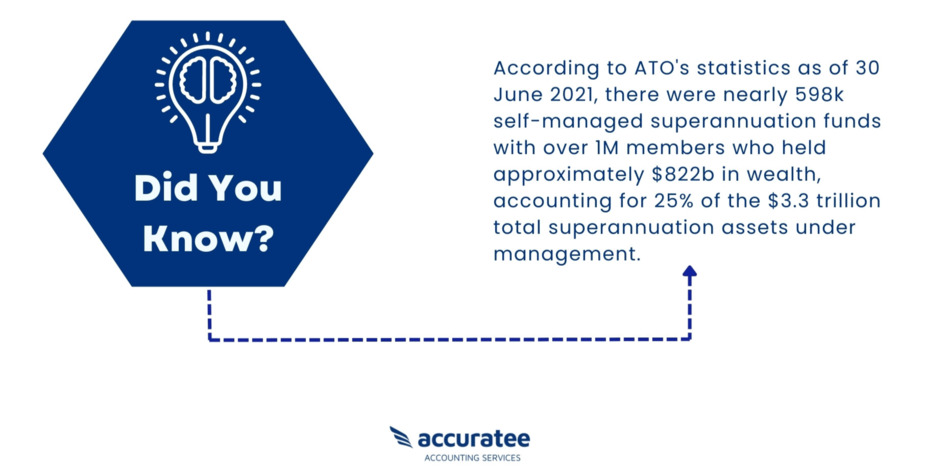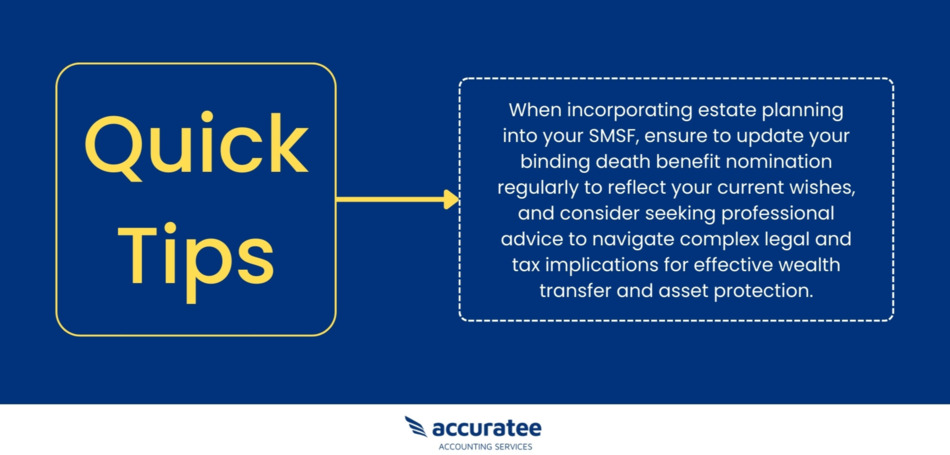The importance of estate planning in self-managed super funds (SMSFs)
Introduction:
In the realm of self-managed super funds (SMSFs), estate planning holds a pivotal role in securing your financial legacy and protecting the future of your loved ones. It is an often underestimated aspect of managing retirement savings, yet its significance cannot be overstated. Estate planning ensures that your hard-earned assets are distributed according to your wishes, minimizing tax implications and providing financial security for your family.
This blog takes a comprehensive look at the importance of estate planning for SMSFs and provides valuable insights on how to approach it effectively. From understanding the underlying reasons behind estate planning to navigating the necessary steps, we delve into the significance of this practice in securing your financial legacy and providing for your loved ones.
Key takeaways
SMSFs and estate planning are interconnected, and incorporating it is crucial to avoid disputes and legal challenges.
Incorporating estate planning into SMSFs offers benefits such as smooth asset transition, tax efficiency, flexibility of options, secure investments, and more.
SMSF trustees and estate planners must collaborate for a comprehensive plan with minimized risks and maximized benefits.
Incorporating estate planning into SMSFs is easy to set up and manage with the help of experienced professionals and online tools.
What is SMSF?
SMSF stands for self-managed super funds and it is a type of superannuation fund that allows individuals to manage their own investments for their retirement.
This means that instead of relying on an external company to manage their retirement savings, individuals are able to make investment decisions and tailor their funds to suit their personal needs and goals.
SMSFs are becoming increasingly popular in Australia due to the greater level of control they provide, however, they are also subject to strict regulations and compliance requirements.
If you are considering setting up an SMSF, it is important to seek professional advice to ensure you are meeting all legal requirements and are making informed investment decisions.

What is estate planning?
Estate planning is a crucial step in ensuring that your assets are distributed according to your wishes after your death. It involves the development of a sound legal strategy, which includes creating a legally-binding will and establishing other legal instruments and structures for transferring your assets.
Taxation is a significant aspect of estate planning, and it's essential to manage the risks related to tax. By having strong governance processes that take tax matters into account when administering an estate, you can be confident that your assets will be distributed in a way that reflects your wishes.
Proper estate planning is an essential element of the overall financial security for you and your loved ones.
Relationship between SMSF and estate planning
The relationship between self-managed superannuation funds (SMSFs) and estate planning is an important and often-overlooked aspect of financial planning. SMSFs bring unique investment options and control to the table, but their complexity, legal ramifications, and tax implications demand that they be incorporated into any estate planning strategy.
Proper management and structuring of your SMSF can ensure that your hard-earned assets are distributed efficiently and effectively, avoiding costly disputes and legal challenges.
SMSF trustees need to work collaboratively with their estate planners in order to create a clear and comprehensive plan that considers financial, tax, and legal matters in order to minimize risks and maximize benefits. As the SMSF environment continues to evolve, ongoing monitoring and adjustments are essential to maximize SMSFs use in your estate plan.
How to create estate planning using SMSF?
Creating estate planning using a Self-Managed Superannuation Fund (SMSF) involves careful consideration of your assets, beneficiaries, and the legal requirements of your jurisdiction. Here are some steps to help you get started:
-
Review the trust deed:
The first step is to review your SMSF's trust deed, which outlines the rules and provisions governing your fund. Ensure that the trust deed allows for estate planning strategies, including the nomination of beneficiaries.
-
Understand superannuation laws:
Familiarize yourself with the superannuation laws and regulations in your country, as they may dictate how your SMSF can distribute assets upon your death. For example, in Australia, superannuation death benefits are subject to specific rules outlined in the Superannuation Industry (Supervision) Act 1993.
-
Beneficiary nominations:
Determine how you want your superannuation benefits to be distributed upon your death. In some cases, you may be able to make binding or non-binding nominations regarding the distribution of your superannuation assets. Consider who you would like to receive your benefits and specify their shares. Keep in mind that these nominations need to comply with your SMSF's trust deed and the relevant legal requirements.
-
Consider testamentary trusts:
If you have substantial assets within your SMSF, it may be beneficial to establish a testamentary trust as part of your estate planning. A testamentary trust is a trust that is created upon your death and can offer various benefits, such as tax advantages and asset protection for beneficiaries. Seek professional advice to determine if this is appropriate for your situation.
-
Seek professional advice:
Estate planning can be complex, and it's crucial to seek advice from professionals who specialize in this area. Consult with a SMSF accountant or an estate planning lawyer who can help you navigate the taxation and legal aspects of creating an effective estate plan using your SMSF.
Remember, estate planning is a highly personalized process, and the specific strategies and considerations will vary depending on your individual circumstances and the legal requirements of your jurisdiction. Therefore, it's essential to consult with professionals who can provide tailored advice for your situation.

Top 10 benefits of incorporating estate planning in SMSF
Here are the top 10 benefits of incorporating estate planning into your SMSF:
-
Smooth transition of assets:
With estate planning in SMSF, the assets can be transferred smoothly to the intended beneficiaries. This helps avoid any disputes or disagreements between family members and other stakeholders when it comes to asset division. The trustees of an SMSF can set up a binding death benefit nomination which allows them to nominate who should receive the benefits upon their death and in what proportion.
-
Tax efficiency:
Incorporating estate planning into SMSF helps transfer assets to beneficiaries efficiently. For instance, transferring assets through Estate Planning can provide additional tax benefits for beneficiaries under 18. Contributions to superannuation funds are taxed at concessional rates, ensuring maximum benefits for beneficiaries. However, staying informed about tax law changes is crucial as it can impact estate planning strategies. Consultation with a qualified tax professional or accountant is strongly recommended to navigate these complexities.
-
Flexibility of options:
Estate planning with SMSF provides flexibility when it comes to structuring and managing assets for future generations. It allows trustees to determine what assets should be allocated and in which proportion. This provides the beneficiaries with sufficient options to choose from as well as the flexibility to amend and adjust these plans according to their needs and requirements.
-
Secure investment:
By incorporating estate planning into SMSF, trustees can secure their investments for future generations. This ensures that the beneficiaries can benefit from these investments regardless of market conditions. The trustees can also direct their investments to low-risk options such as fixed deposits and other conservative investment strategies which would minimize losses in case of any adverse market changes.
-
Privacy and confidentiality:
Incorporating estate planning into your SMSF offers enhanced privacy and confidentiality compared to other investments. SMSF trustees are legally bound to keep your information confidential, preventing unauthorized sharing or selling of your personal data. With a well-defined estate plan, your wishes can be executed privately after your demise, avoiding public disclosure of your private affairs.
-
Reduced probate costs:
By incorporating estate planning into your SMSF, you can reduce the costs associated with probate. Probate is the process of distributing your assets in accordance with your wishes after your death, and it can be a lengthy and expensive undertaking. Incorporating estate planning into your SMSF allows your beneficiaries to avoid the probate process, allowing them a quicker and more cost-effective means of receiving their inheritance. By taking every precaution to protect your assets and your loved ones, you're ensuring the longevity and stability of your legacy for generations to come.
-
To plan for philanthropic goals:
Incorporating estate planning into your SMSF allows for the consideration of philanthropic goals as part of your plan. By incorporating your charitable wishes and intentions, you can make sure that a portion of your assets are used to support charities or causes that are important to you. This is a great way to ensure that even after you're gone, you can still make a difference in the world.
-
To plan for disability:
Incorporating estate planning into your SMSF offers many benefits, including the ability to plan for unexpected misfortunes such as disability. The importance of this cannot be overstated, as disability can happen to anyone at any time. Ensuring that your SMSF has solid estate planning provisions in place can provide peace of mind, knowing that you and your loved ones will be safeguarded in the event of such an occurrence.
-
To plan for life insurance:
Incorporating estate planning into your SMSF can be beneficial in providing adequate life insurance coverage, which is particularly important if you have dependents. This will ensure that any outstanding debts are settled and that those who depend on you financially will be provided for after your passing. Furthermore, it can help to provide for funerals and other final expenses.
-
Easy to manage:
Last but not least, incorporating estate planning into your SMSF is easy to set up and manage. You can easily find an experienced financial adviser or lawyer who will be able to provide guidance in setting up a comprehensive plan that meets your needs. Additionally, there are many online tools available that can help you understand the requirements of such a plan and provide the necessary paperwork to get you started. With the right guidance, estate planning can be a straightforward process that ensures your assets are managed and distributed according to your wishes.
Expert Bookkeeping at Your Fingertips!
Conclusion
Estate planning is a crucial component of self-managed super funds and it is highly recommended for anyone who currently owns or plans to own an SMSF. Estate planning helps ensure that assets are to be transferred to designated beneficiaries in the most cost effective, timely, and tax advantaged manner. It can also prolong the survival of an SMSF’s fund structure over multiple generations.
By properly creating and managing your estate plan, you can maximize its beneficial impact on your beneficiaries and protect your family from unpleasant surprises and costly mistakes.
To make sure you have incorporated everything correctly, do seek out professional help from experienced estate planning advisors such as CleanSlate. At CleanSlate, our team of qualified professionals are here to help you create an effective and long lasting estate plan. Contact us today to get started!


















